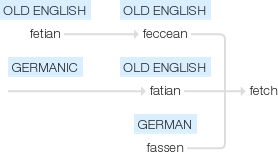Fetch
Old English fecc(e)an, variant of fetian, probably related to fatian ‘grasp’, of Germanic origin and related to German fassen .
wiktionary
The verb is derived from Middle English fecchen(“to get and bring back, fetch; to come for, get and take away; to steal; to carry away to kill; to search for; to obtain, procure”)[and other forms], [1] from Old English feċċan, fæċċan, feccean(“to fetch, bring; to draw; to gain, take; to seek”), a variant of fetian, fatian(“to bring near, fetch; to acquire, obtain; to bring on, induce; to fetch a wife, marry”) [2] and possibly related to Old English facian, fācian(“to acquire, obtain; to try to obtain; to get; to get to, reach”), both from Proto-Germanic *fatōną, *fatjaną(“to hold, seize; to fetch”), from Proto-Indo-European *ped-(“to step, walk; to fall, stumble”). The English word is cognate with Dutch vatten(“to apprehend, catch; to grasp; to understand”), English fet(“(obsolete) to fetch”), Faroese fata(“to grasp, understand”), Swedish fatta(“to grasp, understand”), German fassen(“to catch, grasp; to capture, seize”), Icelandic feta(“to go, step”), West Frisian fetsje(“to grasp”).
The noun is derived from the verb. [3]
Origin uncertain; the following possibilities have been suggested:
etymonline
fetch (v.)
Middle English fecchen, from Old English feccan "to bring, bring to; seek, gain, take," apparently a variant of fetian, fatian "bring near, bring back, obtain; induce; marry," which is probably from Proto-Germanic *fetan (source also of Old Frisian fatia "to grasp, seize, contain," Old Norse feta "to find one's way," Middle Dutch vatten, Old High German sih faggon "to mount, climb," German fassen "to grasp, contain"). This would connect it to the PIE verb for "to walk" derived from root *ped- "foot."
With widespread sense development: to "reach," "deliver," "effect," "make (butter), churn" (19c.), "restore to consciousness" (1620s), also various nautical senses from 16c.-17c.; meaning "to bring in as equivalent or price" is from c. 1600. In 17c. writers on language didn't derive a word's etymology; they fetched it. As what a dog does, c. 1600, originally fetch-and-carry. Variant form fet, a derivation of the original Old English version of the word, survived as a competitor until 17c. Related: Fetched; fetching.
fetch (n.1)
"apparition of a living person, specter, a double," 1787, an English dialect word of unknown origin (see OED for discussion).
A peculiarly weird type of apparition is the wraith (q.v.) or double, of which the Irish fetch is a variant. The wraith is an exact facsimile of a living person, who may himself see it. Goethe, Shelley, and other famous men are said to have seen their own wraiths. The fetch makes its appearance shortly before the death of the person it represents, either to himself or his friends, or both. [Lewis Spence, "An Encyclopedia of Occultism," 1920]
fetch (n.2)
"act of fetching," 1540s, from fetch (v.).
